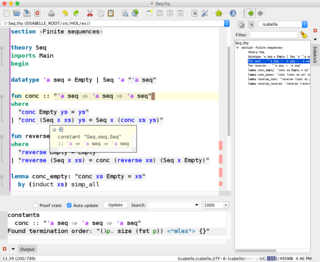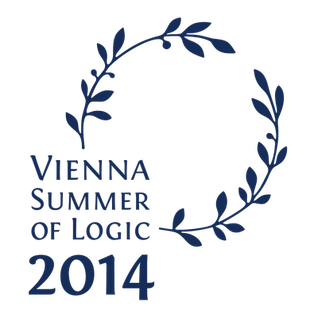Automated theorem proving is a subfield of automated reasoning and mathematical logic dealing with proving mathematical theorems by computer programs. Automated reasoning over mathematical proof was a major impetus for the development of computer science.
In computer science, formal methods are mathematically rigorous techniques for the specification, development, analysis, and verification of software and hardware systems. The use of formal methods for software and hardware design is motivated by the expectation that, as in other engineering disciplines, performing appropriate mathematical analysis can contribute to the reliability and robustness of a design.

The Isabelle automated theorem prover is a higher-order logic (HOL) theorem prover, written in Standard ML and Scala. As an LCF-style theorem prover, it is based on a small logical core (kernel) to increase the trustworthiness of proofs without requiring — yet supporting — explicit proof objects.
The QED manifesto was a proposal for a computer-based database of all mathematical knowledge, strictly formalized and with all proofs having been checked automatically.
E is a high-performance theorem prover for full first-order logic with equality. It is based on the equational superposition calculus and uses a purely equational paradigm. It has been integrated into other theorem provers and it has been among the best-placed systems in several theorem proving competitions. E is developed by Stephan Schulz, originally in the Automated Reasoning Group at TU Munich, now at Baden-Württemberg Cooperative State University Stuttgart.
The Larch Prover, or LP for short, is an interactive theorem proving system for multi-sorted first-order logic. It was used at MIT and elsewhere during the 1990s to reason about designs for circuits, concurrent algorithms, hardware, and software.
The B method is a method of software development based on B, a tool-supported formal method based on an abstract machine notation, used in the development of computer software.
The Conference on Automated Deduction (CADE) is the premier academic conference on automated deduction and related fields. The first CADE was organized in 1974 at the Argonne National Laboratory near Chicago. Most CADE meetings have been held in Europe and the United States. However, conferences have been held all over the world. Since 1996, CADE has been held yearly. In 2001, CADE was, for the first time, merged into the International Joint Conference on Automated Reasoning (IJCAR). This has been repeated biannually since 2004.

Michael John Caldwell Gordon was a British computer scientist.
In computer science, in particular in knowledge representation and reasoning and metalogic, the area of automated reasoning is dedicated to understanding different aspects of reasoning. The study of automated reasoning helps produce computer programs that allow computers to reason completely, or nearly completely, automatically. Although automated reasoning is considered a sub-field of artificial intelligence, it also has connections with theoretical computer science and philosophy.
The International Joint Conference on Automated Reasoning (IJCAR) is a series of conferences on the topics of automated reasoning, automated deduction, and related fields. It is organized semi-regularly as a merger of other meetings. IJCAR replaces those independent conferences in the years it takes place. The conference is organized by CADE Inc., and CADE has always been one of the conferences partaking in IJCAR.
In computer science and mathematical logic, satisfiability modulo theories (SMT) is the problem of determining whether a mathematical formula is satisfiable. It generalizes the Boolean satisfiability problem (SAT) to more complex formulas involving real numbers, integers, and/or various data structures such as lists, arrays, bit vectors, and strings. The name is derived from the fact that these expressions are interpreted within ("modulo") a certain formal theory in first-order logic with equality. SMT solvers are tools that aim to solve the SMT problem for a practical subset of inputs. SMT solvers such as Z3 and cvc5 have been used as a building block for a wide range of applications across computer science, including in automated theorem proving, program analysis, program verification, and software testing.
The International Conference on Automated Reasoning with Analytic Tableaux and Related Methods (TABLEAUX) is an annual international academic conference that deals with all aspects of automated reasoning with analytic tableaux. Periodically, it joins with CADE and TPHOLs into the International Joint Conference on Automated Reasoning (IJCAR).
Rewriting Techniques and Applications (RTA) is an annual international academic conference on the topic of rewriting. It covers all aspects of rewriting, including termination, equational reasoning, theorem proving, higher-order rewriting, unification and the lambda calculus. The conference consists of peer-reviewed papers with the proceedings published by Springer in the LNCS series until 2009, and since then in the LIPIcs series published by the Leibniz-Zentrum für Informatik. Several rewriting-related workshops are also affiliated with RTA.

Geoff Sutcliffe is a US-based computer scientist working in the field of automated reasoning. He was born in the former British colony of Northern Rhodesia , grew up in South Africa, and earned his PhD in Australia. Sutcliffe currently works at the University of Miami, and is of both British and Australian nationality.
The CADE ATP System Competition (CASC) is a yearly competition of fully automated theorem provers for classical logic CASC is associated with the Conference on Automated Deduction and the International Joint Conference on Automated Reasoning organized by the Association for Automated Reasoning. It has inspired similar competition in related fields, in particular the successful SMT-COMP competition for satisfiability modulo theories, the SAT Competition for propositional reasoners, and the modal logic reasoning competition.
Interactive Theorem Proving (ITP) is an annual international academic conference on the topic of automated theorem proving, proof assistants and related topics, ranging from theoretical foundations to implementation aspects and applications in program verification, security, and formalization of mathematics.

The Vienna Summer of Logic was a scientific event in the summer of 2014, combining 12 major conferences and several workshops from the fields of mathematical logic, logic in computer science, and logic in artificial intelligence. The meetings took place from July 9 to 24, 2014, and attracted more than 2000 scientists and researchers.

Grigore Roșu is a computer science professor at the University of Illinois at Urbana-Champaign and a researcher in the Information Trust Institute. He is known for his contributions in runtime verification, the K framework, matching logic, and automated coinduction.




